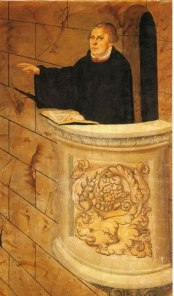
Word of the Day: Homily
Today’s word of the day comes from the Wordsmith website, https://wordsmith.org/words/homily.html. The word is homily. It’s pronounced / ˈhɒm ə li /. Notice that the first syllable is stressed, the second syllable is a schwa, but the vowel in the third syllable is pronounced like the double e in beet, so it must have at least a little bit of stress.
Anu Garg, who wrote the little article to accompany homily, says that the purpose this week is to share words that end in –ly but are not adverbs. Adverbs, particularly adverbs of manner, often end with –ly in English: totally, avidly, deftly, for example. Garg then goes on to give this definition: “A lecture of a moralizing or admonishing nature, usually tedious and trite.” I found this definition interesting because it struck me as unusually narrow and maybe even slightly biased. So I went to www.dictionary.com to see what the definition of homily is on that site, and I found three: “1. a sermon, usually on a Biblical topic and usually of a nondoctrinal nature; 2. an admonitory or moralizing discourse; 3. an inspirational saying or cliché.”
According to Garg, the word comes “From Old French omelie (homily), from Latin (homilia), from Greek homilia (assembly or sermon), from homilos (crowd), from homou (together). Ultimately from the Indo-European root sem- (one), which also gave us simultaneous, assemble, simple, Sanskrit sandhi (union), Russian samovar (a metal urn, literally, self-boiler), and Greek hamadryad (a wood nymph, who lives in a tree and dies when the tree dies), dissimulate, and simulacrum. Earliest documented use: 1386.” The etymology from www.etymonline.com is similar, but it says, “from Church Latin homilia ‘a homily, sermon,’ from Greek homilia ‘conversation, discourse,’ used in New Testament Greek for ‘sermon.’”
According to https://www.askdifference.com/sermon-vs-homily/, there is a difference between a sermon and a homily. It describes a sermon this way: “A sermon is an oration, lecture, or talk by a member of a religious institution or clergy. Sermons address a Biblical, theological, religious, or moral topic, usually expounding on a type of belief, law or behavior within both past and present contexts. Elements of the sermon often include exposition, exhortation and practical application.” A homily, on the other hand, “is a commentary that follows a reading of scripture. In Catholic, Anglican, Lutheran, and Eastern Orthodox Churches, a homily is usually given during Mass (Divine Liturgy or Holy Qurbana for Orthodox and Eastern Catholic Churches, and Divine Service for the Lutheran Church) at the end of the Liturgy of the Word. Many people consider it synonymous with a sermon.” If you remember set theory from high school math, you might say that a homily is a sermon, but a sermon is not necessarily a homily.
A derivation from homily is homiletics, which is the study of art of preaching. If you do an internet search on the word homiletics, you will find a variety of sites that will explain the term as well as links to schools where the subject is taught. Yes, that’s right. Many schools teach homiletics. My own father, who was a Lutheran pastor and had a doctorate in sacred theology, wrote his dissertation on the homiletic tradition in the Lutheran church. Preaching is an art, and a good sermon can take a passage of Scripture and explicate in a way that unpacks the meaning of the passage and makes the passage more memorable.
Yes, there are preachers out there who aren’t very good at the craft. That doesn’t even make them poor ministers because preaching is only one aspect of a minister’s job. I’ve known all kinds of preachers over the years, some boring and sententious, and some really, really good. Most preachers, even the good ones, occasionally have a dud. But a good preacher works at it, researches the passage, and finds what in the passage will connect with his or her congregation.
But I’m guessing that Anu Garg has not had very many good experiences with homilies. That’s just a guess based upon the very narrow definition of homily. But that’s okay. Dictionary writers have been idiosyncratic at least as far as Samuel Johnson, who, in his famous A Dictionary of the English Language in 1755, defined lexicographer as a “writer of dictionaries; a harmless drudge, that busies himself in tracing the original, and detailing the signification of words” (https://johnsonsdictionaryonline.com/lexicographer/). Like me, I suppose.
The image is of Martin Luther preaching at the church in Wittenberg.